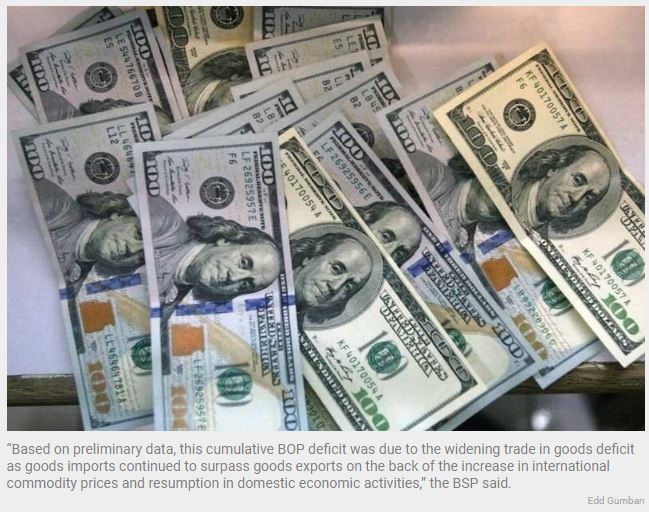Philippines: BOP deficit swells to $7.87 billion in 11 months
MANILA, Philippines — The country’s balance of payments (BOP) deficit ballooned to $7.87 billion from January to November – a sharp reversal of the meager $353 million surplus recorded in the same period last year, according to the Bangko Sentral ng Pilipinas (BSP).
“Based on preliminary data, this cumulative BOP deficit was due to the widening trade in goods deficit as goods imports continued to surpass goods exports on the back of the increase in international commodity prices and resumption in domestic economic activities,” the BSP said.
For November alone, the country’s BOP position returned to a deficit of $756 million, a reversal of the $711 million surplus in October, as more dollars flowed out of the country.
Based on BSP data, the shortfall in November was more than six times the $123 million deficit recorded in the same month last year.
“The BOP deficit in November 2022 reflected outflows arising mainly from the national government’s payments of its foreign currency debt obligations and the BSP’s net foreign exchange operations,” it said.
The BOP is the difference in total values between payments into and out of the country over a period.
A deficit means that more dollars flowed out to pay for the importation of more goods, services and capital than what came in from exports, remittances from overseas Filipino workers (OFWs), business process outsourcing (BPO) earnings and tourism receipts.
Michael Ricafort, chief economist at Rizal Commercial Banking Corp., said the shortfall was largely brought about by the proceeds of the $2 billion global bond issuance of the national government in early October, as well as some net payment of foreign debts by the national government and some BSP foreign exchange operations.
From January to October, the country’s export earnings expanded by 46.5 percent to $66.01 billion from $62.1 billion a year ago, while imports jumped by 22.7 percent to $115.99 billion from $94.5 billion.
This resulted in a trade shortfall of $49.98 billion during the 10-month period, up 54.2 percent from last year’s $32.4 billion.
“For the coming months, especially in December, BOP data could still improve with the expected seasonal increase in the country’s structural inflows in terms of the seasonal increase in OFW remittances, BPO revenues, export revenues, foreign tourism receipts, POGO revenues, among others, in view of the holiday season,” Ricafort said.
According to the BSP, the country’s gross international reserves (GIR) level increased to $95.1 billion as of end-November from $94 billion as of end-October.
The foreign exchange buffer represents a more than adequate external liquidity buffer equivalent to 7.2 months’ worth of imports of goods and payments of services and primary income. It is also about 5.8 times the country’s short-term external debt based on original maturity and 3.8 times based on residual maturity.
The BSP is now expecting the country to book a weaker external payment position and lower foreign exchange buffer next year amid the push by the economic managers for the creation of a sovereign wealth fund.
Dennis Lapid, officer-in-charge of the central bank’s Department of Economic Research, earlier said monetary authorities are now looking at a record high balance of payments deficit of $11.2 billion or 2.8 percent of gross domestic product instead of $8.4 billion or two percent of GDP.
The previous all-time-high BOP deficit was booked at $2.9 billion or one percent of GDP in 2014.
For next year, Lapid said the BSP is looking at a wider BOP deficit of $5.4 billion or 1.3 percent of GDP instead of $2.5 billion or 0.6 percent of GDP.
Lapid also reported that the central bank is now looking at a GIR level of $93 billion for this year and $93 billion for next year.
Source: https://www.philstar.com/business/2022/12/21/2232142/bop-deficit-swells-787-billion-11-months


 Thailand
Thailand




